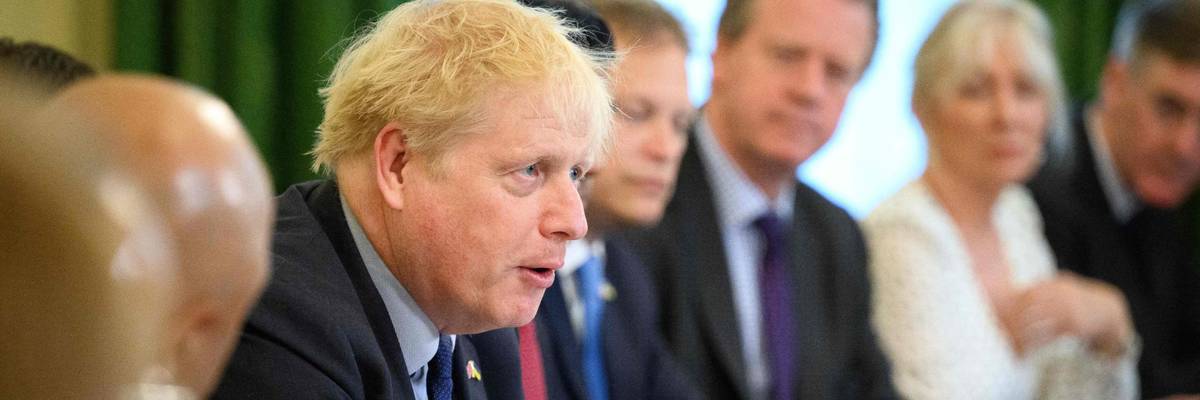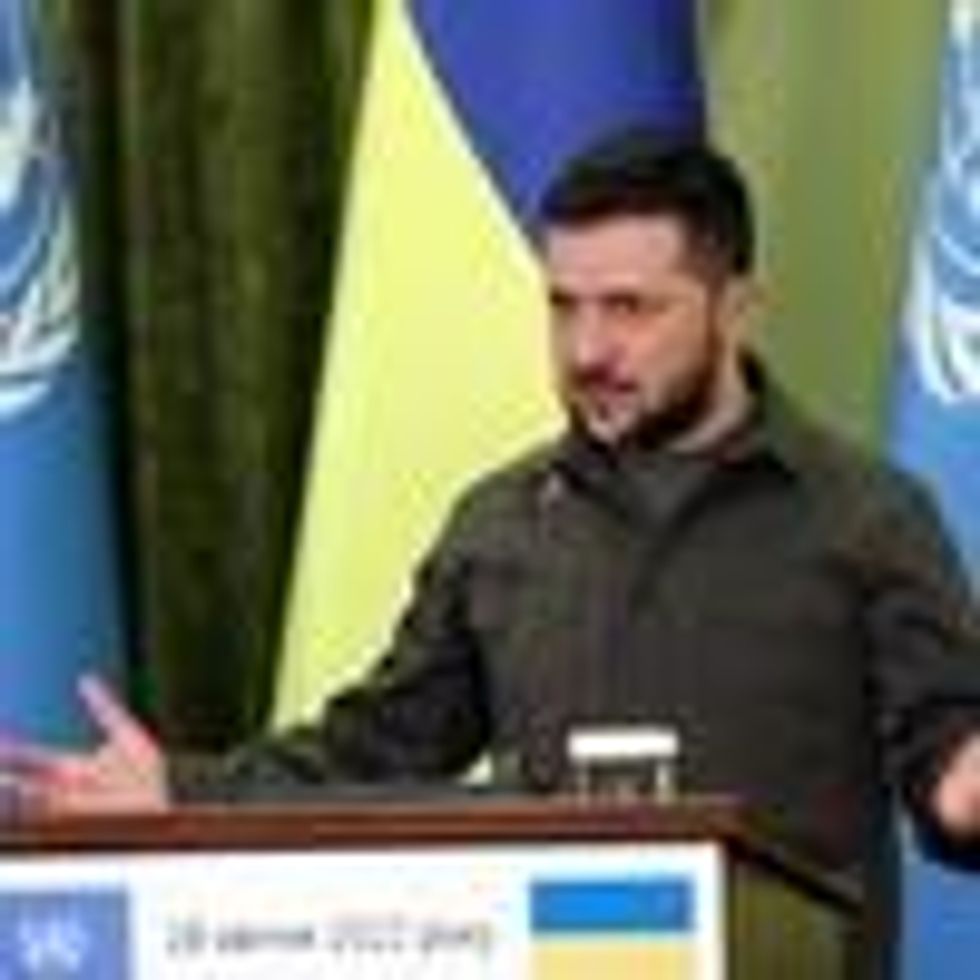

SUBSCRIBE TO OUR FREE NEWSLETTER
Daily news & progressive opinion—funded by the people, not the corporations—delivered straight to your inbox.
5
#000000
#FFFFFF
To donate by check, phone, or other method, see our More Ways to Give page.


Daily news & progressive opinion—funded by the people, not the corporations—delivered straight to your inbox.

Britain's Prime Minister Boris Johnson speaks as he chairs a cabinet meeting at 10 Downing Street in London on June 7, 2022. (Photo: Leon Neal/Pool/AFP via Getty Images)
Fresh off his narrow victory in a closely watched no-confidence vote, British Prime Minister Boris Johnson told his top cabinet ministers on Tuesday that Ukraine should not be pushed to accept a "bad peace" with Russia, remarks that align with private comments he reportedly made to Ukrainian President Volodymyr Zelenskyy in April.
"Britain and the U.S. appear to have abandoned even the limited military restraint they showed early on in the war."
"He said it was vital that President Zelenskyy was not pressured into accepting a bad peace, noting that bad peace deals do not last," Johnson told top officials, according to the prime minister's spokesperson. The official didn't say whether Johnson specified what a "bad" agreement would look like.
"He said the world must avoid any outcome where [Russian President Vladimir] Putin's unwarranted aggression appears to have paid off," the spokesperson added.
Johnson's meeting with cabinet ministers came weeks after the Ukrainian newspaper Ukrayinska Pravda reported that during a visit to Kyiv in April, the British leader urged Zelenskyy to cut off diplomatic talks with Putin, insisting that the Russian president "should be pressured, not negotiated with."
Peace talks have since been at a standstill as Russian forces ramp up their assault on eastern Ukraine and the governments of the United Kingdom and the United States prepare to arm Ukrainian forces with longer-range rocket systems, heightening fears of a broader war between Russia and NATO.
Chris Nineham, the vice chair of the U.K.-based Stop the War Coalition, warned Monday that Johnson's continued opposition to diplomatic talks with Russia will only serve to prolong the devastating war and compound its grisly humanitarian toll.
"It is first and foremost the Ukrainians who will suffer from this approach as the conflict turns into a terrible war of attrition," Nineham wrote in a blog post, accusing the U.K. and other western powers of "deliberately trying to head off moves towards serious negotiations."
On Monday, Zelenskyy said peace talks with Moscow are currently at "level zero" as Russian forces have occupied roughly 20% of Ukrainian territory. While demanding a one-on-one meeting with Putin, Zelenskyy has said he is unwilling to make territorial concessions as part of any diplomatic settlement with Russia.
"We want the Russian army to leave our land--we aren't on Russian soil," Zelenskyy said last month. "We won't help Putin save face by paying with our territory. That would be unjust."
Related Content

In his blog post on Monday, Nineham argued that the West's push for "nothing less than the complete defeat of Russia" has significantly heightened the chances that Russia's war will spread beyond Ukraine.
"The war has global implications," Nineham wrote, "and the risks of a frightening military clash between nuclear-armed great powers are higher than at any time for half a century."
"Britain and the U.S. appear to have abandoned even the limited military restraint they showed early on in the war," he added. "Their policy of pumping in the weapons and pushing for outright victory risks disaster."
Dear Common Dreams reader, The U.S. is on a fast track to authoritarianism like nothing I've ever seen. Meanwhile, corporate news outlets are utterly capitulating to Trump, twisting their coverage to avoid drawing his ire while lining up to stuff cash in his pockets. That's why I believe that Common Dreams is doing the best and most consequential reporting that we've ever done. Our small but mighty team is a progressive reporting powerhouse, covering the news every day that the corporate media never will. Our mission has always been simple: To inform. To inspire. And to ignite change for the common good. Now here's the key piece that I want all our readers to understand: None of this would be possible without your financial support. That's not just some fundraising cliche. It's the absolute and literal truth. We don't accept corporate advertising and never will. We don't have a paywall because we don't think people should be blocked from critical news based on their ability to pay. Everything we do is funded by the donations of readers like you. Will you donate now to help power the nonprofit, independent reporting of Common Dreams? Thank you for being a vital member of our community. Together, we can keep independent journalism alive when it’s needed most. - Craig Brown, Co-founder |
Fresh off his narrow victory in a closely watched no-confidence vote, British Prime Minister Boris Johnson told his top cabinet ministers on Tuesday that Ukraine should not be pushed to accept a "bad peace" with Russia, remarks that align with private comments he reportedly made to Ukrainian President Volodymyr Zelenskyy in April.
"Britain and the U.S. appear to have abandoned even the limited military restraint they showed early on in the war."
"He said it was vital that President Zelenskyy was not pressured into accepting a bad peace, noting that bad peace deals do not last," Johnson told top officials, according to the prime minister's spokesperson. The official didn't say whether Johnson specified what a "bad" agreement would look like.
"He said the world must avoid any outcome where [Russian President Vladimir] Putin's unwarranted aggression appears to have paid off," the spokesperson added.
Johnson's meeting with cabinet ministers came weeks after the Ukrainian newspaper Ukrayinska Pravda reported that during a visit to Kyiv in April, the British leader urged Zelenskyy to cut off diplomatic talks with Putin, insisting that the Russian president "should be pressured, not negotiated with."
Peace talks have since been at a standstill as Russian forces ramp up their assault on eastern Ukraine and the governments of the United Kingdom and the United States prepare to arm Ukrainian forces with longer-range rocket systems, heightening fears of a broader war between Russia and NATO.
Chris Nineham, the vice chair of the U.K.-based Stop the War Coalition, warned Monday that Johnson's continued opposition to diplomatic talks with Russia will only serve to prolong the devastating war and compound its grisly humanitarian toll.
"It is first and foremost the Ukrainians who will suffer from this approach as the conflict turns into a terrible war of attrition," Nineham wrote in a blog post, accusing the U.K. and other western powers of "deliberately trying to head off moves towards serious negotiations."
On Monday, Zelenskyy said peace talks with Moscow are currently at "level zero" as Russian forces have occupied roughly 20% of Ukrainian territory. While demanding a one-on-one meeting with Putin, Zelenskyy has said he is unwilling to make territorial concessions as part of any diplomatic settlement with Russia.
"We want the Russian army to leave our land--we aren't on Russian soil," Zelenskyy said last month. "We won't help Putin save face by paying with our territory. That would be unjust."
Related Content

In his blog post on Monday, Nineham argued that the West's push for "nothing less than the complete defeat of Russia" has significantly heightened the chances that Russia's war will spread beyond Ukraine.
"The war has global implications," Nineham wrote, "and the risks of a frightening military clash between nuclear-armed great powers are higher than at any time for half a century."
"Britain and the U.S. appear to have abandoned even the limited military restraint they showed early on in the war," he added. "Their policy of pumping in the weapons and pushing for outright victory risks disaster."
Fresh off his narrow victory in a closely watched no-confidence vote, British Prime Minister Boris Johnson told his top cabinet ministers on Tuesday that Ukraine should not be pushed to accept a "bad peace" with Russia, remarks that align with private comments he reportedly made to Ukrainian President Volodymyr Zelenskyy in April.
"Britain and the U.S. appear to have abandoned even the limited military restraint they showed early on in the war."
"He said it was vital that President Zelenskyy was not pressured into accepting a bad peace, noting that bad peace deals do not last," Johnson told top officials, according to the prime minister's spokesperson. The official didn't say whether Johnson specified what a "bad" agreement would look like.
"He said the world must avoid any outcome where [Russian President Vladimir] Putin's unwarranted aggression appears to have paid off," the spokesperson added.
Johnson's meeting with cabinet ministers came weeks after the Ukrainian newspaper Ukrayinska Pravda reported that during a visit to Kyiv in April, the British leader urged Zelenskyy to cut off diplomatic talks with Putin, insisting that the Russian president "should be pressured, not negotiated with."
Peace talks have since been at a standstill as Russian forces ramp up their assault on eastern Ukraine and the governments of the United Kingdom and the United States prepare to arm Ukrainian forces with longer-range rocket systems, heightening fears of a broader war between Russia and NATO.
Chris Nineham, the vice chair of the U.K.-based Stop the War Coalition, warned Monday that Johnson's continued opposition to diplomatic talks with Russia will only serve to prolong the devastating war and compound its grisly humanitarian toll.
"It is first and foremost the Ukrainians who will suffer from this approach as the conflict turns into a terrible war of attrition," Nineham wrote in a blog post, accusing the U.K. and other western powers of "deliberately trying to head off moves towards serious negotiations."
On Monday, Zelenskyy said peace talks with Moscow are currently at "level zero" as Russian forces have occupied roughly 20% of Ukrainian territory. While demanding a one-on-one meeting with Putin, Zelenskyy has said he is unwilling to make territorial concessions as part of any diplomatic settlement with Russia.
"We want the Russian army to leave our land--we aren't on Russian soil," Zelenskyy said last month. "We won't help Putin save face by paying with our territory. That would be unjust."
Related Content

In his blog post on Monday, Nineham argued that the West's push for "nothing less than the complete defeat of Russia" has significantly heightened the chances that Russia's war will spread beyond Ukraine.
"The war has global implications," Nineham wrote, "and the risks of a frightening military clash between nuclear-armed great powers are higher than at any time for half a century."
"Britain and the U.S. appear to have abandoned even the limited military restraint they showed early on in the war," he added. "Their policy of pumping in the weapons and pushing for outright victory risks disaster."